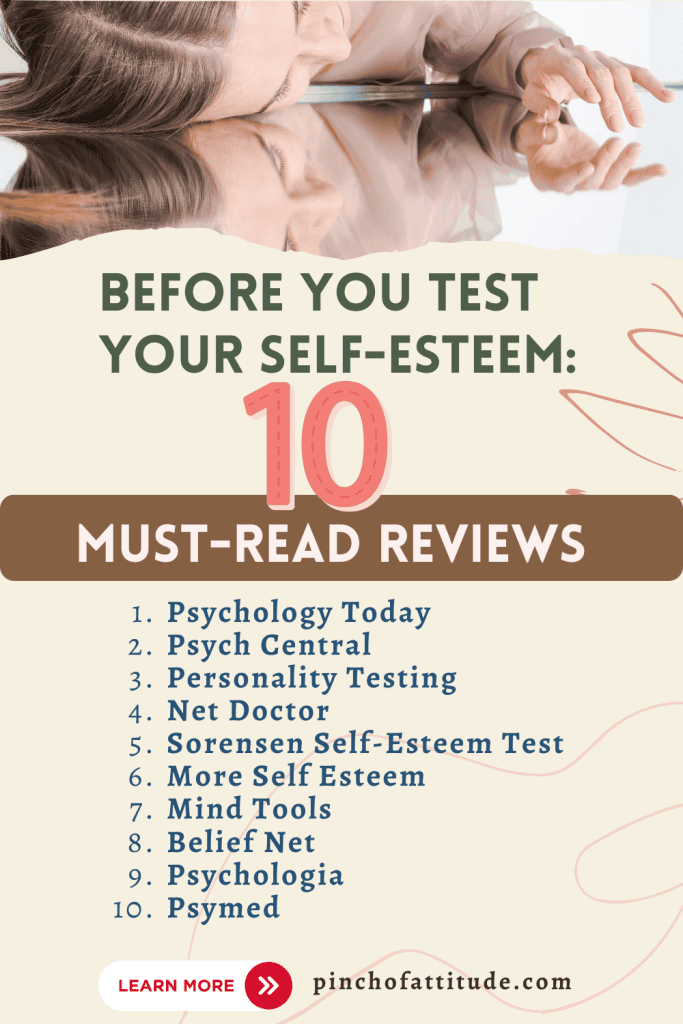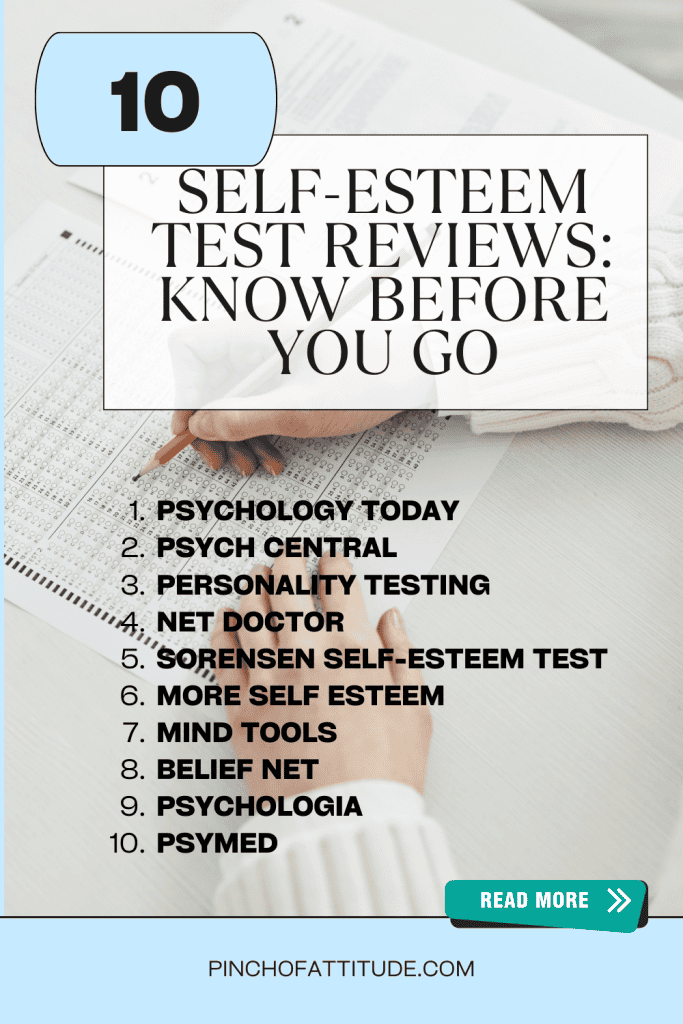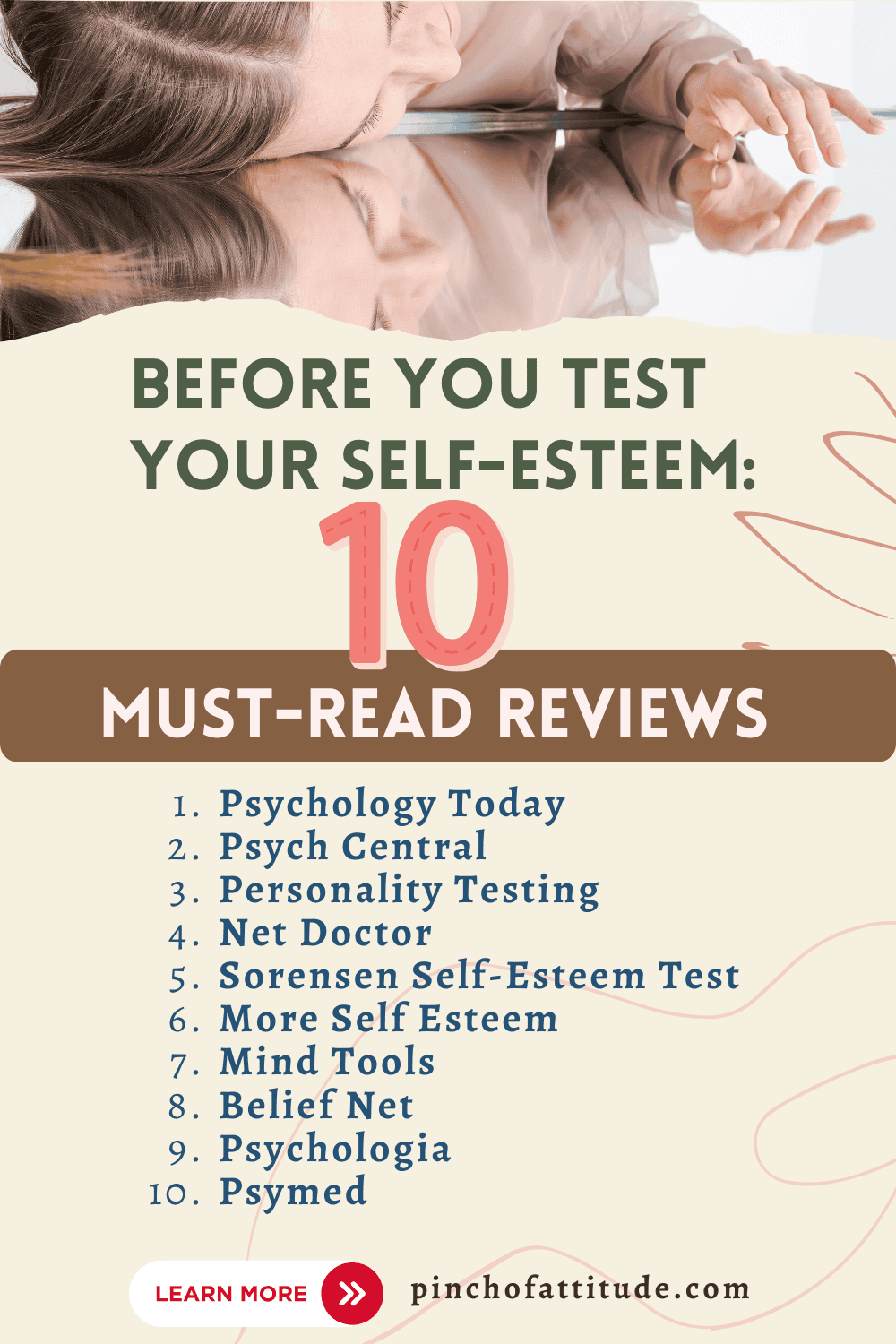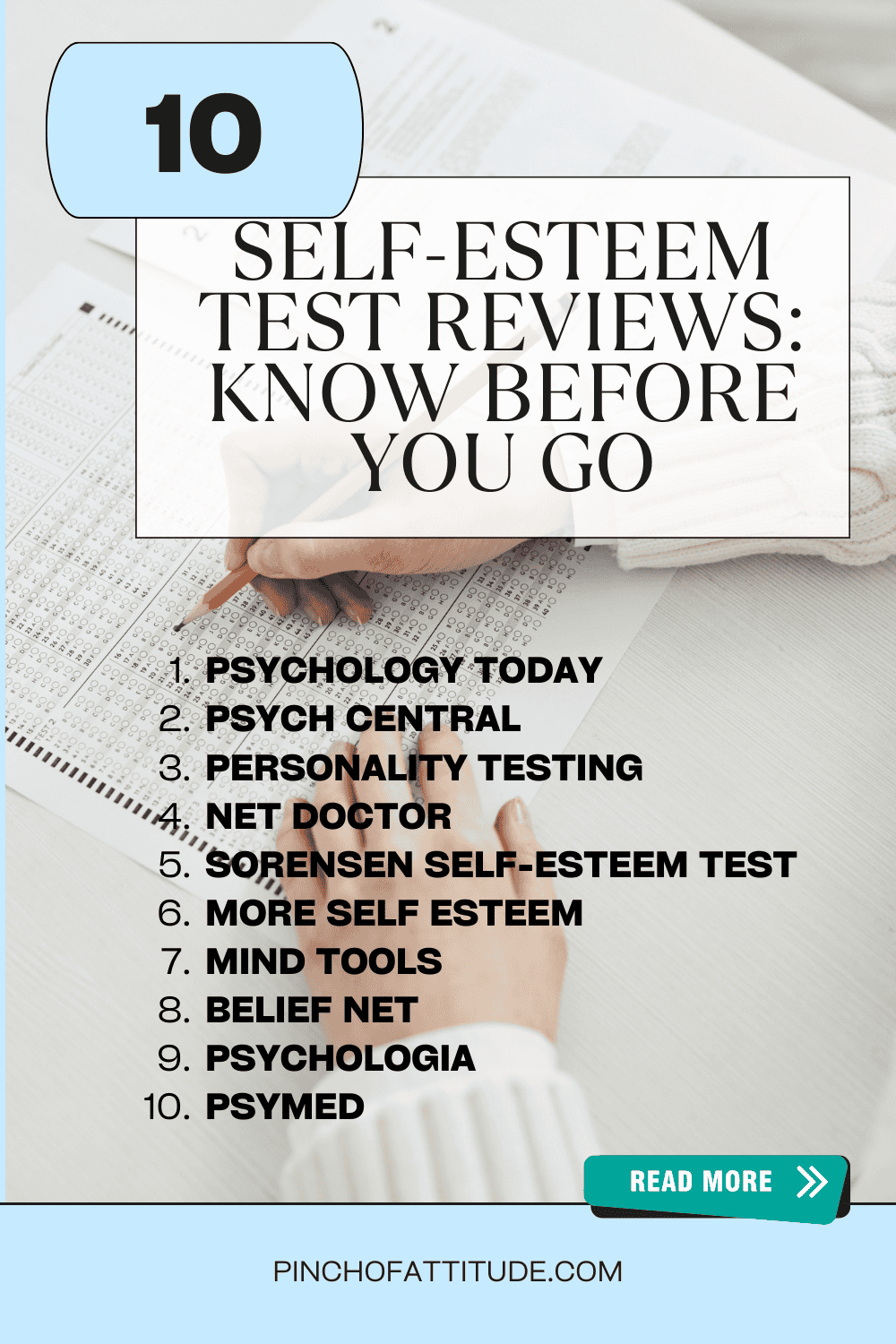Self-esteem test is the answer to a simple, yet intimidating question: “How do I feel about who I am?” At the same time, it is what drives us forward or keeps holding us back.
In psychology, it reflects a person’s overall subjective, emotional evaluation of their own worth, but in practice, the self-concept determines how easily we embrace who we truly are. Being a foundation for personal growth, the judgment of self-worth sets the course of our entire lives.
For some people, both assessment and revelation are deterring. It’s only human that each of us wants to be the best possible version of ourselves, but this is sometimes easier said than done.
Luckily, self-esteem isn’t set in stone, which means that there’s always room for improvement. The only thing we need to do is to overcome fear and take a long, piercing look into ourselves.
Online self-esteem tests are in no way a substitution for a professional diagnosis, but they are a good way to start looking for answers. Here’s where and how in no particular ranking.

Table of Contents
1. Psychology Today
As the website claims, Psychology Today’s self-esteem test was developed for those who want to evaluate their general level of self-esteem.
This 15-minute-long process of looking at oneself is so much more. Not only does the test give you a clear notion of whether you need to work on your self-image or not, but it also provides actionable tips on how to do so.
Number of questions: 34
The time it takes to complete: 15 minutes
Free or at a cost: You’ll receive a part of your results for free, but a full report comes at a price of $6.95.
The evaluation is free, but the depth of analysis depends on your willingness to pay. If you take it for free, you’ll be offered a Snapshot Report that showcases nothing but your “Ability to Deal with Rejection”, graded on a scale from 0 to 100.
The full report costs $6.95, and it gives you a clear, comprehensive image of who you are. Along with an Intro and a Summary that evaluates and interprets your “Overall Results”, the paid description of your self-regard provides four sections more: Graphs, Detailed Results, Strengths and Limitations, and Advice.
In Graphs, your “Sense of Self-Efficacy”, “Ability to Deal with Rejection”, “Ability to Deal with Criticism” and “Feeling Loved by Others” will be graphically reviewed on a scale from 0 to 100. Together, these four elements create a solid sense of self, necessary for leading a fulfilling and productive life. The Detailed Results section revisits all four, together with general explanations and commentaries about your current level of confidence.
Strengths & Limitations are organized a bit differently. In accordance with the results, the test will list a number of your personal qualities and weaknesses. While the strengths are there to let you know that you have a lot to be confident about, the limitations will show you where you can start your journey to personal growth.
As arguably the best part of the entire test, the Advice section takes your overall results into consideration and offers a number of inspiring quotes and an elaborate list of practical tips to use in your everyday life. If you need to enhance your ability to cope with stress, for instance, you’ll be given a few strategies that you can employ.
A self-esteem test might not be able to replace a professional evaluation, but Psychology Today certainly offers the next best thing. The full report will tell you both what to be proud of and what needs to be changed, which is definitely worth the price.
2. Psych Central

Designed on the same principle as Psychology Today’s test, a self-confidence quiz developed by Psych Central will take no more than 5 minutes of your time. The results are measured in by how strongly you agree with the statements, so don’t hesitate to answer honestly.
Number of questions: 10
The time it takes to complete: 5 Minutes
Free or at a cost: You can take an abridged version of the test for free.
Though the introduction indicates that the test is an abridged version, it doesn’t disclose precise information about how detailed the report actually is. In the end, you’ll be able to read a fairly generalized paragraph on self-esteem and its importance for personal happiness, relationships, and success. Your results will be generalized and presented on the “Overall Results” scale accompanied by a brief analysis.
In case you want to know more about your true sense of self, Psych Central will provide a preview of an extended version. It appears to be the same as Psychology Today’s Graphs section, though: four scales for determining your “Sense of Self-Efficacy”, “Ability to Deal with Rejection”, “Ability to Deal with Criticism” and “Feeling Loved by Others”. The full report supposedly includes advice for building and keeping high self-esteem as well.
However, the apparent lack of transparency isn’t this test’s biggest shortcoming. Even though the version in question is abridged, the number of questions is still too small for the test to be able to provide anything but a cursory report. If your self-confidence is high enough, there’s really no harm done; but, if your self-image is somewhat distorted, better look for advice someplace else.
3. Personality Testing
Unlike the majority of self-esteem tests that can be found online, Personality Testing takes a refreshing approach. It’s not that the actual questions differ from a myriad of others; the concept, however, does. From the very start, you’ll be informed that the results won’t tell you anything you didn’t know before, but that you will surely gain a better picture of your mental state in relation to other people.
Number of questions: 10
The time it takes to complete: 2-5 minutes
Free or at a cost: Although the test is free, the introduction clearly states that your answers will be used as part of a research project and that you are giving consent for your responses to be used.
What makes Personality Testing different is the fact that it is an online version of the scientifically-acclaimed Rosenberg self-esteem scale. Developed as a measure for the current self-confidence state, it is now widely used and considered a reliable and valid quantitative tool for such psychological assessments.
Just like the original test, the Personality Testing questionnaire ranks your confidence levels on a scale from 0 to 30. In case your results are lower than 15, this might be the time to start reflecting on the thoughts, feelings, and opinions you’ve developed about your own worth. It’s not a call for help, but an opportunity to acknowledge your accomplishments and get in touch with your frustrations.
The report is quite simple – along with your result, you’ll receive a graph of how other people scored on this test. Personality Testing doesn’t reveal much about your personality, and it doesn’t intend to do so. The purpose of comparing your score with other people’s scores is to help you establish your sense of self in the grand scheme of things. Simply put, this test will show you that insecurity troubles us all.
4. Net Doctor
Net Doctor is not just another great self-esteem test. Once you receive the results, you can spend hours enjoying the site’s blog – innumerable wellness tips and helpful advice on beauty, parenting, and nutrition are at the tips of your fingers, along with forums, a symptom checker, and a number of health quizzes. If you do need something to boost your confidence, Net Doctor is certainly a good place to start.
Number of questions: 20
Time it takes to complete: 5 minutes
Free or at a cost: Free
Being a wellness blog, Net Doctor avoids scientific methodology in favor of encouraging and inspiring its readers. Designed in a similar tone, their self-esteem test is delightfully simple and straightforward in every single aspect. This applies to questions, the “Never/Occasionally/Often/Always” response concept, and score analysis alike since neither will make you feel anxious about coming face to face with your deepest insecurities.
The score is measured on a scale from 0 to 100 and explained in a couple of short, yet informative sentences. Quite succinctly, they will tell you whether your overall self-confidence is good or not and proceed to remind you that you’re not alone in your struggles. The report is highly personalized for each person, which means that it will stress exactly those concerns that you need to address.
If you score 55 points, for example, you’ll receive the following analysis: “You have quite good self-esteem on the whole. But you sometimes fail to believe in yourself enough. Remember you are a special and unique person. Many people with your score feel confident in what they do for a living and get a lot of affirmation from that. It’s important, however, to feel good about who you are, not just about what you do. Have a think about this.”
It’s not an in-depth report, but it’s surely effective. By pointing out your problems first and easing your worries immediately after, Net Doctor urges you to re-examine both your strengths and your weaknesses. A healthy mind accepts that “It’s only human to make mistakes”, and that’s exactly what this test is made to remind you of.
5. Sorensen Self-Esteem Test
There’s nothing complicated about the Sorensen Self-Esteem Test, which is simultaneously this questionnaire’s strongest and weakest trait. Since low self-esteem is often misunderstood, as the introduction claims, we need to dive deeper in order to identify the core issues that lay behind our psychological, emotional, personal, and relationship struggles. With as many as 50 questions, this test does exactly that.
Number of questions: 50
The time it takes to complete: 15
Free or at a cost: Free
While most tests offer fewer questions and multiple-choice answers, the Sorensen Self-Esteem Test provides a long list of unambiguous statements that you may find true or false. Simply check those that are applicable to your feelings toward yourself and personal experience with others around you, and the test will measure your score in real time.
Conforming to the initial claim, the questions cover a wide range of potential causes and circumstances that people with low self-confidence will easily relate to. Whether you frequently feel anxious in new social situations, depressed about the things you’ve done, frustratingly embarrassed when involved in sex, or have been neglected or discouraged as a child, this quiz will thoroughly examine your entire psychological profile.
Though this is the only certain way of assessing whether your feelings of low self-worth are moderate or severe, the report doesn’t explore the full potential of such a measurement. Supported by an exhaustive set of questions that take into account different aspects of your psychogenic life (from inherent traits and upbringing to social behavior and work-related issues), the analysis could actually pinpoint your root problems and establish a course of treatment. Unfortunately, it only gauges your score from fairly good to severely low.
On the upside, the Sorensen Self-Esteem Test is available in printable PDF format that you can forward to others who share your mental health concerns.
6. More Self Esteem
The More Self-Esteem test was created by the owner of the site, Karl Perera. As cited in the About Me section, the author is a qualified Coach (specializing in Self-Esteem Coaching and Academic Coaching) with a simple mission: to use his expertise and personal experience to do “something positive and helpful”. A single glance at the blog is enough to confirm his assertion.
Number of questions: 16
The time it takes to complete: 5 Minutes
Free or at a cost: The test is free, though the author urges those who intend to use it for educational courses or syllabuses to pay a fee.
Apart from being confusing at times, which requires a person to read some of the statements twice, the test is easy enough to take. After only 5 minutes or less, your answers will be analyzed and the result will showcase your level of self-regard.
If it turns out that your self-esteem is high, the result will be followed by a rewarding exclamation mark. In case you’re somewhere in the middle, the author will warn you that there’s room for improvement or that your judgment of self is actually holding you back. But, if your self-esteem is drastically low, you’ll be told so in the form of yet another exclamatory sentence. It may be an alarming matter, but the author should be a bit more tactful about it.
The report doesn’t offer in-depth analysis, graphs, and scales, but it does link to appropriate articles from the blog. If you choose to click, you’ll be able to learn more about your state and how to cure it. Just like he promises, Perera’s advice is highly helpful and he provides actionable tips on how to improve your negative thoughts, handle failure, or use visualization to achieve your dreams. These are only a few of the articles available, and the rest of the articles are all interlinked with a number of self-esteem-related blog posts, including a hypnosis guide and a list of positive affirmations and quotes.
Personal growth requires a lot of learning, which is something that the author of the More Self-Esteem test understands very well. Kudos to him for building a comprehensive library of material that’s truly useful and inspirational at the same time.
7. Mind Tools

Mind Tools chooses to focus on a more practical side of mental health. Being dedicated to the enhancement of career skills, this website encourages readers to embrace the work-life balance philosophy and teaches them how to do so in the most effective and organic way. For that reason, their self-esteem test relies heavily on the self-efficiency theory, about which you can learn a lot from the introduction.
Number of questions: 14
The time it takes to complete: 3 minutes
Free or at a cost: Free
If you’ve ever been frustrated by the insufficient number of response choices, you’ll be pleasantly surprised with the additional nuances included in this test. Instead of a traditional “Agree/Disagree” method, Mind Tools offers five possible answers to each statement: “Not at All”, “Rarely”, “Sometimes”, “Often” and “Very Often”. With more variables added to the equation, you can rest assured that the end result is as accurate as you would expect it to be.
The report section might not be personalized and tidy, but it gives you an opportunity to scratch beneath the surface. You’ll receive a Score Interpretation table where you can read about how secure with yourself you are, along with a link to a short guide on how to build your self-confidence.
The guide is the same for all testees, regardless of how they’ve scored on the test. It includes advice on “Developing Mastery Experiences”, “Observing Others” and “Managing Stress”, as well as “Key Points” with general tips on becoming more self-sufficient.
Though these sections won’t tell you anything new, they’ll provide a couple of links leading to elaborate articles on how to think positively, become optimistic, develop effective goals, improve problem-solving and manage stress. Just like More Self Esteem, Mind Tools conveniently combines your results with step-by-step guides that are information-dense and full of valuable tips that you can apply to your everyday life.
8. Belief Net
“Are you your own cheerleader or your worst enemy?” The Belief Net obviously avoids beating around the bush, since their quiz will welcome you with this straightforward and somewhat scary question. Don’t be intimidated by what you might find out, though, for it’s all for your own betterment.
Number of questions: 15
The time it takes to complete: 5-10 minutes
Free or at a cost: Free
Unlike other self-esteem tests that tend to approach your mental issues from a scientific standpoint, Belief Net’s questionnaire is closer to a purely entertaining pop quiz. The test itself is different as well, in that it offers full answers instead of a usual “right or wrong” response concept. As such, some questions will leave you no choice but to respond only partially correctly.
You’ll find that the analysis is quite short. It’s a succinct paragraph that either tells you that you’re in need of a self-esteem boost or congratulates you on your level of self-regard. In no more than a few sentences, the report will explain your result and go on to succinctly suggest what you can do to improve it.
Since Belief Net’s main goal is to motivate you to start taking better care of your psyche, don’t expect to receive a proper diagnosis. For those who are more curious than concerned, it’s a delightful pastime with no real benefits other than promoting general mental health awareness.
9. Psychologia
If, on the other hand, you seek blogs that are both entertaining and informational, look no further than Psychologia. The Self-Esteem and Self-Confidence Assessment Test is just one option from their extensive collection, along with a handful of truly interesting ones like the Japanese Love and Personality Test, and Your Ideal Partner’s Height and Creativity Test, just to name a few. A psychologically savvy person could spend hours researching the blog, and they would still be hungry for more.
Number of questions: 32
The time it takes to complete: 10 minutes
Free or at a cost: Free
When it comes to the actual test, however, it doesn’t deliver much insight. Given that it takes around 10 minutes to finish, a testee would expect a more detailed report. Instead, it merely identifies your level of self-esteem – high, average, or low – and interprets your results with a couple of generic statements.
Similar to the Belief Net’s test, this quiz might leave you a bit disappointed. Stick around, though: the rest of the site is teeming with resources about mental health and a fulfilling lifestyle, starting with personality type facts and concluding with tips on careers, relationships, and happiness.
10. Psymed
The self-esteem quiz isn’t the only type of test that you can take on Psymed. You can evaluate yourself further by answering questions about depression, borderline disorders, sociopathy, and dyslexia too, but unfortunately, you’ll receive little benefits.
Number of questions: 15
The time it takes to complete: 5 minutes
Free or at a cost: Free
Designed to measure how objectively you perceive your self-worth, the test has 15 questions and multiple choice answers (“Strongly Agree/Agree/Partly Agree/Strongly Disagree” or “Never/Rarely/Sometimes/Often/Always”). Once you’re done, the report will tell you nothing other than how high your self-regard is. Though reports of some of the previous tests are equally brief, this one doesn’t even come across as motivational. There are no links for further reading either, only some generic feedback that states that you might or might not “have some mental health issues”. For a tool that’s supposed to help you grow, Psymed is quite discouraging.




